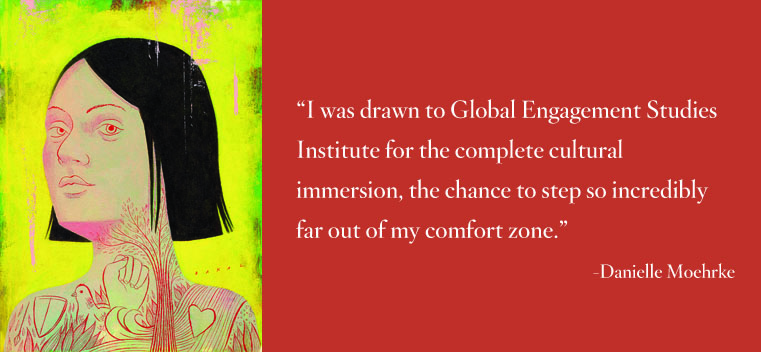
A Commitment to Global Communities
Find Us on Social Media
Global Engagement Studies Institute program blends elements of study abroad, consulting and service.
A nervous Ahsin Azim thrust his spear toward the sky, hoisted his shield and then moved his body to the boom of the drum. An hour after arriving at his summer study abroad homestay in South Africa, Azim found himself in the middle of a muchongolo, with a throng of villagers cheering him on in the traditional dance.
That was his welcome to the village of Clare, his host community for the Global Engagement Studies Institute program. Last summer the junior American studies and creative nonfiction major spent eight weeks in South Africa, working with local women entrepreneurs, who sold handmade dresses and beaded jewelry, handbags and other items out of their homes, to establish a small business network and open up a central shop.
More than 60 students from Northwestern and 13 other colleges and universities dedicated their summer to GESI, a Northwestern-based program that combines elements of study abroad, consulting and service-learning and sends students to one of 17 sites in five countries — Bolivia, India, Nicaragua, South Africa and Uganda. (GESI is exploring new site possibilities in Southeast Asia and other African destinations.)
The students live with local families and work with community-based or nongovernmental organizations to develop sustainable solutions to issues in areas such as public health, education and women’s empowerment. Nearly 200 students have participated in GESI since 2005.
It’s an intense and unusual learning experience.
“I was drawn to GESI for the complete cultural immersion, the chance to step so incredibly far out of my comfort zone,” says junior Danielle Moehrke, who spent her summer working on brand identity with women who run a soap factory that doubles as a day care in Cochabamba, Bolivia. “It was a brilliant way to learn more about myself and a new culture and hopefully do a little good in the process.”
The students go through a 72-hour boot camp of academic preparation for GESI — studying leadership, team building and community-based approaches to development, as well as local politics and customs and basic language skills, with professors Paul Arntson and Brian Hanson. The latter oversees the Center for Global Engagement, which administers the GESI program. The students also return to Evanston for three days to reflect on and discuss their experiences at the end of the program.
“A lot of other programs will send students abroad to do service but won’t really give them a framework to understand the issues they’re working on, to think about their roles as outsiders responsibly,” says CGE assistant director Nicole Patel (WCAS06). “We teach students to think of the communities that they’re working with as equal people who have ideas, resources and their own solutions to the problems they’re facing.”
The students, working in interdisciplinary teams of three to five, design and implement their own development projects. On one recent project, students, with the help of a local translator, explored how residents of a 3,000-household tribal community used the natural resources in a forest that India’s Foundation for Ecological Security hoped to protect. The team put together a series of proposals, including increasing compost pit practices and using smokeless stoves that require less wood fuel.
On another project, students linked residents of a poor village in Uganda with a microfinance operation and a local chicken hatchery — and its hen expert — to build a healthy, sustainable chicken production operation.
“Not all projects go this swimmingly,” says Patel. “We had students trying to teach youth about sexual reproductive health in India, where cultural norms don’t even let you use the word ‘sex.’ Those are great cultural learning opportunities.”
Hanson, the director of programs, operations and research at the Buffett Center for International and Comparative Studies, hopes to expand those opportunities to a more diverse group of students. Last year the Buffett Center provided more than $154,000 for GESI scholarships that supported nearly half of the 2011 participants. (The full cost is usually around $7,500, plus airfare.)
Those funds helped change Kirk Vaclavik’s view of the world. “I no longer think of community development as just simple, self-satisfying service work,” says Vaclavik, a junior who worked in Uganda with a health care organization that focused on HIV/AIDS. “It is something that demands critical thought and complex planning because of its capacity for deep impact on real people.”



 Facebook
Facebook Twitter
Twitter Email
Email


